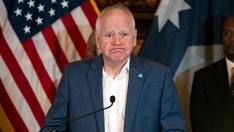The Israeli military’s latest wave of airstrikes in Iran dealt a serious blow to the country’s brutal internal security apparatus, opening the door for a potential uprising.
During the strikes, Israel ‘dropped dozens of munitions on the Basij and internal security command centers that are subject to the Iranian terror regime,’ the Israel Defense Forces (IDF) said in a statement on Wednesday. ‘The targeted command centers were used by the Iranian regime to maintain control throughout Iran and maintain the regime’s situational assessments.’
Since the start of Operation Epic Fury, the U.S. has hit nearly 2,000 targets as it carries out a sweeping military campaign aimed at dismantling the regime’s security apparatus and neutralizing threats. Adm. Brad Cooper of U.S. Central Command confirmed the number of targets hit in a video message.
The Islamic Revolutionary Guard Corps (IRGC) and the Basij militia, Iran’s volunteer paramilitary force, were behind the violent crackdown on protesters in January. The bloody crackdown saw regime actors firing on crowds and conducting mass arrests of Iranian protesters. Some had seen the protests as a sign that regime change in Iran was getting nearer, though it did not occur.
Israeli and U.S. officials have hinted at the possibility of regime change in Iran as both countries take aim at Tehran’s military and security sites.
Israeli Prime Minister Benjamin Netanyahu said in a video message announcing the launch of Operation Epic Fury, which Israel calls Operation Rising Lion, that it was time for Iranians ‘to rid themselves of the yoke of tyranny.’ Similarly, President Donald Trump said in a message to the Iranian people on Feb. 28 that ‘the hour of your freedom is at hand.’
‘When we are finished, take over your government. It will be yours to take. This will be, probably, your only chance for generations,’ Trump said.
‘America is backing you with overwhelming strength and devastating force. Now is the time to seize control of your destiny, and to unleash the prosperous and glorious future that is close within your reach. This is the moment for action. Do not let it pass,’ the president added.
Ali Vaez, director of the Iran project at the International Crisis Group, told The Wall Street Journal that the path to regime change through foreign airstrikes and popular uprising on the ground has ‘a bet that rests on no clear historical model.’ Vaez also warned that the idea ‘ignores the resilience of entrenched authoritarian systems like the Islamic Republic.’
The IDF said on Monday that Israel had hit headquarters, bases and regional command centers that belonged to the regime’s internal security apparatus.
‘These bodies were responsible for, among other things, suppressing protests against the regime through violent measures and civilian arrests,’ the IDF said.
It is unclear who will lead Iran after Supreme Leader Ayatollah Ali Khamenei was killed on the first day of the operation. Since then, Israel and the U.S. have made it clear that regime leaders chosen to replace him would be targets. Israeli Defense Minister Israel Katz warned on Wednesday that anyone chosen to replace Khamenei would be considered ‘a target for elimination’ if they continued to threaten Israel, the U.S. and regional allies.
The killing of key leaders might not be enough to cause an uprising, as the regime has a monopoly on weapons in most of Iran, the WSJ reported, adding that Basij militants are still patrolling the streets.
Fox News Digital’s Morgan Phillips and Efrat Lachter contributed to this report.










